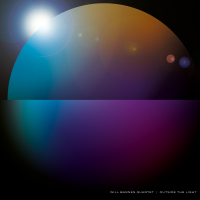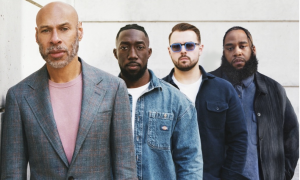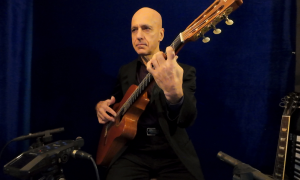By Steve Provizer
Getting married tends to take a guy out of the blog loop, but like Freddie Kruger, I manage to stay alive for the sequels...
I just finished reading “Hotter Than That," sub-titled “The Trumpet, Jazz and American Culture." I might add-"That's Awfully Grandiose For A Book That Slices Off Such A Teeny Tiny Piece of It," but that's the kind of blurb and sub-title hyperbole that jazz books aimed for a general audience sometimes indulge in.
I realized after I read it that Krin Gabbard, the author, had edited two weightier tomes I read a while back when I was contemplating going to grad school: “Jazz Among the Discourses“ and “Representing Jazz;" the kind of stuff that convinced me my place was not in the Academy.
There is interesting material in this book-trumpet history, the dangers/early deaths of trumpeters, some material on how the trumpet is made (albeit with too much conversation with and about Dave Monette), a variably entertaining exegesis about Miles-but remembering Gabbard's academic inclinations helped me understand why he took such pains to introduce a “THESIS" into “Hotter Than That;" a thesis requiring significant mental contortions and sporadic leaps from a high, shaky scaffold into a shot glass-sized target.
Here it is: The choice of the trumpet signifies the need of the trumpet player to express his manhood. African-American players, starting from Buddy Bolden, were given few ways to express their manhood, therefore grasped eagerly at this opportunity and developed all the possible musical-and extra-musical ways (clothes, strut) to accomplish it. White players ("who unquestionably possessed a special breed of masculinity" saw this and, rather than becoming athletes or professionals, became jazz musicians. His case extends to saying that Goodman hired Cootie, Dorsey took on Shavers and Shaw hired Lips Page in order to “boost their (the band leaders) masculine presentation." Whoa.
Alright, we've talked enough about ego in this blog to not dismiss this thesis entirely, especially in the case of African-American musicians, who indeed had far fewer choices for anything. But why push it so far? (WARNING: amateur shrinkage ahead). Gabbard is an aspiring trumpet player himself, and I can't help but notice how longingly he talks about hitting the high C's and reaching that hyper-masculine, testosrerone-riddled musical pinnacle: The Lead Trumpet Player.
He seems to be aware of the other pleasures of playing and also says that “a lead trumpeter might also be a nerd masquerading as a brute." He admits there are some great female players and also notes the fact that the guitar replaced the trumpet as our adolescent male's chief macho instrumental choice. None of this seems to derail him from his need to return to the masculinity leit motif.
So, you trumpet players out there, seems like the safest thing is just to fess up. You know you suffer from a lack of hormonal self-confidence, so wise up, cop to it and give it a gangster lean. Just repeat after me: “I'm too sexy for my Benge, too sexy for my Schilke, too sexy for my Bach..."
Getting married tends to take a guy out of the blog loop, but like Freddie Kruger, I manage to stay alive for the sequels...
I just finished reading “Hotter Than That," sub-titled “The Trumpet, Jazz and American Culture." I might add-"That's Awfully Grandiose For A Book That Slices Off Such A Teeny Tiny Piece of It," but that's the kind of blurb and sub-title hyperbole that jazz books aimed for a general audience sometimes indulge in.
I realized after I read it that Krin Gabbard, the author, had edited two weightier tomes I read a while back when I was contemplating going to grad school: “Jazz Among the Discourses“ and “Representing Jazz;" the kind of stuff that convinced me my place was not in the Academy.
There is interesting material in this book-trumpet history, the dangers/early deaths of trumpeters, some material on how the trumpet is made (albeit with too much conversation with and about Dave Monette), a variably entertaining exegesis about Miles-but remembering Gabbard's academic inclinations helped me understand why he took such pains to introduce a “THESIS" into “Hotter Than That;" a thesis requiring significant mental contortions and sporadic leaps from a high, shaky scaffold into a shot glass-sized target.
Here it is: The choice of the trumpet signifies the need of the trumpet player to express his manhood. African-American players, starting from Buddy Bolden, were given few ways to express their manhood, therefore grasped eagerly at this opportunity and developed all the possible musical-and extra-musical ways (clothes, strut) to accomplish it. White players ("who unquestionably possessed a special breed of masculinity" saw this and, rather than becoming athletes or professionals, became jazz musicians. His case extends to saying that Goodman hired Cootie, Dorsey took on Shavers and Shaw hired Lips Page in order to “boost their (the band leaders) masculine presentation." Whoa.
Alright, we've talked enough about ego in this blog to not dismiss this thesis entirely, especially in the case of African-American musicians, who indeed had far fewer choices for anything. But why push it so far? (WARNING: amateur shrinkage ahead). Gabbard is an aspiring trumpet player himself, and I can't help but notice how longingly he talks about hitting the high C's and reaching that hyper-masculine, testosrerone-riddled musical pinnacle: The Lead Trumpet Player.
He seems to be aware of the other pleasures of playing and also says that “a lead trumpeter might also be a nerd masquerading as a brute." He admits there are some great female players and also notes the fact that the guitar replaced the trumpet as our adolescent male's chief macho instrumental choice. None of this seems to derail him from his need to return to the masculinity leit motif.
So, you trumpet players out there, seems like the safest thing is just to fess up. You know you suffer from a lack of hormonal self-confidence, so wise up, cop to it and give it a gangster lean. Just repeat after me: “I'm too sexy for my Benge, too sexy for my Schilke, too sexy for my Bach..."



















